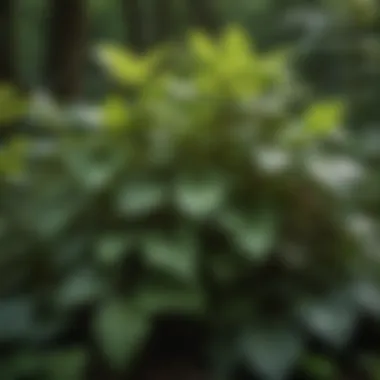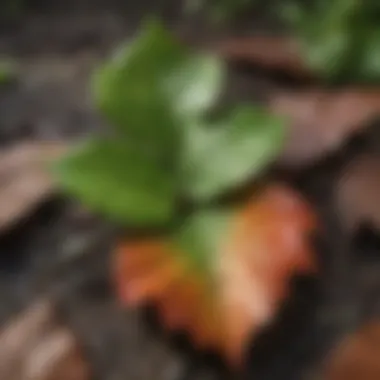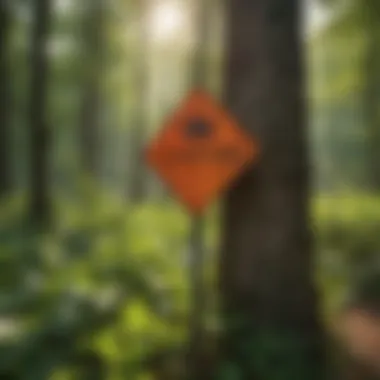Where to Find Poison Ivy Plants for Sale: A Comprehensive Guide


Forest Management Techniques
Forest management techniques play a crucial role in maintaining the delicate balance of ecosystems within evergreen forests. It is imperative to implement effective strategies to sustain biodiversity and ensure the long-term health of these valuable habitats.
Wildlife Habitat Preservation
Preserving wildlife habitats is a key component of responsible forest management. By implementing measures to protect and enhance natural habitats, we can support a diverse array of plant and animal species that depend on these environments for survival. Strategies include the creation of wildlife corridors, nesting areas, and food sources to promote biodiversity and ecological resilience.
Sustainable Logging Practices
Sustainable logging practices are essential for mitigating the environmental impact of timber harvesting within evergreen forests. By adopting responsible forestry operations that prioritize ecosystem health and longevity, we can ensure the sustainable utilization of forest resources for future generations. This includes selective logging, reforestation efforts, and adherence to strict regulations governing timber harvesting.
Fire Prevention Measures
Preventing forest fires is crucial for preserving evergreen forests and safeguarding against the devastating effects of uncontrolled wildfires. Implementing early detection systems, regular patrols, and public awareness campaigns can help reduce the risk of forest fires and protect the delicate balance of these ecosystems. By investing in fire prevention measures, we can mitigate the loss of valuable forest resources and reduce environmental damage.
Ecosystem Restoration Initiatives
Ecosystem restoration initiatives aim to rejuvenate degraded lands and promote the recovery of damaged ecosystems within evergreen forests. By undertaking reforestation projects, habitat restoration efforts, and invasive species management, we can enhance the resilience of these ecosystems and support their long-term health. Collaborative partnerships between government agencies, conservation organizations, and local communities are essential for the success of ecosystem restoration initiatives.
Introduction
In the intriguing realm of acquiring poison ivy plants, the significance of this pursuit extends far beyond mere botanical curiosity. The world of poison ivy, with its infamous three-leaf configuration, sparks a profound interest among enthusiasts and researchers alike. Understanding where and how one can obtain such plants is pivotal for those exploring the depths of botanical intricacies. This article serves as a guiding light, illuminating the path towards purchasing poison ivy plants with prudence and awareness.
Understanding Poison Ivy
Characteristics of Poison Ivy
Delving into the realm of poison ivy, one cannot disregard the distinctive characteristics that set this plant apart. The shiny leaves of three, along with their vibrant green hue, make poison ivy an unmistakable presence in various landscapes. Despite its notorious reputation for causing skin irritations, poison ivy remains a sought-after botanical specimen for its unique appearance and natural allure. Understanding these defining features of poison ivy is essential for enthusiasts seeking to broaden their botanical understanding.
Toxicity Levels
The toxicity levels associated with poison ivy stand as a stark reminder of nature's potent defense mechanisms. The urushiol oil present in poison ivy leaves serves as the primary culprit behind the skin rashes and irritations experienced upon contact. While the plant's toxicity levels pose significant challenges, they also unveil the intricate interplay between flora and fauna in the natural world. Exploring the nuances of poison ivy's toxicity levels sheds light on the delicate balance maintained by ecosystems.
Impact on Humans


The impact of poison ivy on humans transcends mere physical discomfort, delving into the realms of dermatological care and environmental awareness. Understanding how poison ivy interacts with the human skin and body provides valuable insights into toxin management and mitigation strategies. By comprehending the intricacies of poison ivy's effects on humans, individuals can approach the plant with a heightened sense of caution and preparedness.
Purpose of Buying Poison Ivy Plants
Research Purposes
The acquisition of poison ivy plants for research purposes opens doors to a myriad of scientific inquiries and botanical studies. Researchers exploring plant physiology, toxicity mechanisms, and ecological interactions find value in studying poison ivy's distinctive properties. Through careful observation and controlled experiments, the enigmatic nature of poison ivy unfolds, offering researchers a glimpse into the complex world of toxic flora.
Landscaping and Gardening
For landscaping enthusiasts and gardening aficionados, the inclusion of poison ivy plants in outdoor spaces adds a touch of wild beauty and natural charm. Integrating poison ivy into garden designs and landscape arrangements requires a delicate balance between aesthetic appeal and safety considerations. The unique foliage of poison ivy lends a sense of untamed wilderness to curated outdoor environments, creating a distinctive ambiance that resonates with lovers of botanical diversity.
Potential Sources for Buying Poison Ivy Plants
When considering the acquisition of poison ivy plants, it is crucial to explore various potential sources to make an informed decision. This section highlights the importance of understanding where to purchase these plants, emphasizing the significance of caution and awareness when dealing with toxic flora. By examining different sources, individuals can ensure they procure poison ivy plants from reputable establishments, mitigating potential risks associated with improper handling or care.
Local Plant Nurseries
Local plant nurseries serve as convenient avenues for sourcing poison ivy plants. These establishments, which specialize in cultivating and selling a diverse range of plant species, play a pivotal role in making these unique plants accessible to enthusiasts and researchers alike.
Specialty Nurseries
Specialty nurseries offer a focused selection of plants, including poison ivy, catering to specific interests or needs. Their commitment to providing high-quality specimens reflects in the meticulous care devoted to cultivating these plants, ensuring their health and vitality. Enthusiasts seeking well-maintained poison ivy variants may find specialty nurseries to be an ideal option, given the expertise and attention to detail they offer.
Advantages of Specialty Nurseries
One key advantage of specialty nurseries is the expertise of staff members, who possess in-depth knowledge about the plants they cultivate. This enables customers to receive valuable advice on caring for their poison ivy plants, promoting successful growth and maintenance. Additionally, the specialized focus of these nurseries enhances the likelihood of finding rare or unique poison ivy varieties, expanding options for enthusiasts seeking distinct specimens.
Garden Centers
Garden centers, widespread in many communities, also serve as viable sources for purchasing poison ivy plants. These establishments cater to a broad clientele interested in gardening and landscaping, offering a varied selection of plant species, including poison ivy.
Advantages of Garden Centers
Garden centers provide a convenient shopping experience for individuals looking to acquire poison ivy plants alongside other gardening supplies. Their diverse inventory and accessibility make them a popular choice among hobbyists and homeowners seeking to incorporate toxic flora into their landscapes. Moreover, the availability of knowledgeable staff at garden centers can assist customers in selecting suitable poison ivy varieties and provide guidance on proper care and maintenance.
Online Retailers


In the digital age, online retailers have emerged as prominent sources for procuring poison ivy plants, offering a convenient platform for browsing and purchasing these unique specimens.
Plant Marketplaces
Online plant marketplaces facilitate the exchange of various plant species, including poison ivy, among sellers and buyers. These platforms connect gardening enthusiasts and collectors worldwide, enabling them to access a wide array of plant options, often including rare or hard-to-find varieties of poison ivy.
Advantages of Plant Marketplaces
Plant marketplaces present a global marketplace for sourcing poison ivy plants, allowing individuals to discover unique variants from different regions. This diversity expands the options available to enthusiasts seeking specific characteristics or traits in their poison ivy specimens. Furthermore, the presence of reputable sellers on plant marketplaces ensures the quality and authenticity of plants offered, giving buyers confidence in their purchases.
Websites Specializing in Rare Plants
Websites dedicated to rare plants constitute another avenue for purchasing poison ivy, catering to collectors and botanical enthusiasts with a penchant for unique flora. These online platforms feature an extensive selection of rare and exotic plants, including distinct varieties of poison ivy.
Advantages of Websites Specializing in Rare Plants
Specialized websites focusing on rare plants provide a curated selection of poison ivy specimens, often showcasing exclusive or limited-edition varieties. For collectors or researchers seeking uncommon or specialty poison ivy plants, these websites offer a trove of intriguing options. Additionally, the convenience of online transactions and shipping services simplifies the process of acquiring rare poison ivy plants, enabling enthusiasts to expand their collections with ease.
Considerations Before Buying
When it comes to purchasing poison ivy plants, considering certain factors before making a decision is crucial. This section delves into the essential elements that individuals must keep in mind to ensure a safe and informed purchase process. Understanding the legal restrictions, safety precautions, and potential risks associated with buying poison ivy plants is paramount for responsible plant acquisition.
Legal Restrictions
Regulatory Guidelines
Regulatory guidelines play a significant role in governing the purchase and possession of potentially hazardous plants like poison ivy. These guidelines establish the framework within which individuals can legally obtain and handle such plants. By adhering to regulatory guidelines, individuals contribute to the overall safety and accountability within the plant acquisition process. A key characteristic of regulatory guidelines is their emphasis on ensuring that buyers meet specific criteria and follow designated protocols to prevent misuse or mishandling of toxic plants. While regulatory guidelines help regulate the procurement of poison ivy plants, they may also pose challenges due to varying interpretations and enforcement practices.
Permit Requirements
Permit requirements serve as an additional layer of oversight in the procurement of poison ivy plants. These requirements often involve obtaining specific permits or licenses to legally buy and possess toxic flora. The key characteristic of permit requirements is their role in monitoring and controlling the sale and ownership of regulated plants like poison ivy. By implementing permit requirements, regulatory bodies aim to track the distribution and use of toxic plants, minimizing the potential risks associated with their misuse. However, acquiring permits may pose logistical challenges and bureaucratic hurdles, potentially limiting access to poison ivy plants for legitimate purposes.
Safety Precautions
Handling Protocols
Effective handling protocols are essential when dealing with toxic plants such as poison ivy. These protocols outline the proper procedures for transporting, planting, and maintaining poison ivy to minimize the risks of exposure and contamination. The key characteristic of handling protocols is their emphasis on safe practices and containment measures to prevent accidental contact with the plant's toxic components. By following established handling protocols, individuals reduce the likelihood of adverse health effects and environmental contamination linked to poison ivy exposure.


Protective Gear
Utilizing appropriate protective gear is crucial when engaging with poison ivy plants to safeguard against potential health hazards. Protective gear includes items such as gloves, masks, and coveralls designed to shield individuals from direct contact with the plant's irritants. The key characteristic of protective gear is its role in providing a physical barrier between individuals and toxic plants, reducing the chances of skin irritation or allergic reactions. While protective gear offers valuable protection, users must ensure proper equipment selection and maintenance to maximize its effectiveness in preventing poison ivy-related risks.
Risks and Warnings
Risks and Warnings section in this article is fundamental as it sheds light on the critical aspects associated with purchasing poison ivy plants. It serves as a vital cautionary segment, ensuring readers are well-informed about the potential hazards and challenges linked to dealing with toxic flora. By exploring the risks and warnings, readers gain a comprehensive understanding of the importance of approaching the acquisition of poison ivy plants with utmost care and consideration. This section delves into the key areas that individuals should be aware of before purchasing poison ivy plants, emphasizing the need for diligence and adherence to safety guidelines.
Allergic Reactions
Symptoms
Symptoms of allergic reactions to poison ivy plants play a crucial role in highlighting the body's response to the toxic substances present in these plants. Understanding the symptoms is essential for individuals who may come into contact with poison ivy, as it enables them to promptly identify and address any allergic reactions that may occur. Common symptoms such as redness, itching, and blistering are indicative of the body's immune response to the plant's irritants. By elaborating on the specifics of these symptoms, individuals can better recognize and manage any allergic reactions that may arise from exposure to poison ivy plants, ensuring timely intervention and treatment.
Treatment Options
Exploring treatment options for allergic reactions to poison ivy plants is crucial in mitigating the discomfort and potential complications that may arise from exposure to these toxic plants. By discussing various treatment methods such as topical ointments, oral medications, and home remedies, individuals gain insight into effective strategies for alleviating the symptoms of allergic reactions. Highlighting the benefits and drawbacks of different treatment approaches enables readers to make informed decisions regarding their healthcare and well-being. Providing guidance on the appropriate steps to take in case of an allergic reaction empowers individuals to effectively manage their symptoms and seek professional medical assistance when necessary.
Legal Implications
Liability Issues
Delving into the legal implications surrounding the purchase and ownership of poison ivy plants, the section on liability issues elucidates the responsibilities and potential consequences that individuals may face. By examining the legal framework governing the cultivation and distribution of toxic flora, readers gain a comprehensive understanding of their liabilities in acquiring and handling poison ivy plants. Addressing issues such as property damage, personal injury claims, and regulatory compliance, this section emphasizes the importance of exercising caution and prudence when dealing with potentially harmful vegetation.
Regulatory Consequences
Analyzing the regulatory consequences of purchasing and possessing poison ivy plants is essential in ensuring compliance with laws and regulations governing the cultivation and trade of hazardous flora. By exploring the legal ramifications of improper handling or cultivation of poison ivy, individuals are made aware of the potential legal penalties and repercussions they may face. Understanding the regulatory framework surrounding toxic plants equips readers with the knowledge needed to navigate legal considerations and uphold ethical practices in their interactions with poison ivy. By outlining the regulatory consequences, this section serves as a vital guide for individuals seeking to engage responsibly with toxic flora within the bounds of the law.
Conclusion
In the realm of buying poison ivy plants, it is crucial to approach the topic with the utmost caution and awareness. The acquisition of these toxic flora requires a deep understanding of the potential risks involved and the considerations that must be taken into account. By delving into various sources for purchasing poison ivy plants, individuals can make informed decisions that align with their specific needs and purposes. Whether for research or landscaping purposes, ensuring compliance with legal restrictions and prioritizing safety precautions are paramount. By contemplating the risks and warnings associated with poison ivy plants, individuals can navigate this terrain with prudence and foresight, minimizing the likelihood of adverse outcomes.
The Conclusion section encapsulates the essential elements discussed throughout this article, underscoring the significance of informed decision-making and proper plant care when it comes to purchasing poison ivy plants. By synthesizing the information presented, readers gain a comprehensive guide that equips them with the knowledge and insights needed to navigate the realm of toxic flora responsibly and effectively.
Final Thoughts on Buying Poison Ivy Plants
Importance of Informed Decision-Making
In the domain of purchasing poison ivy plants, the importance of informed decision-making cannot be overstated. This critical aspect emphasizes the need for thorough research, careful consideration of options, and a deep understanding of the implications associated with acquiring toxic flora. By prioritizing informed decision-making, individuals can mitigate risks, safeguard against potential hazards, and align their purchasing choices with their broader objectives. The key characteristic of this approach lies in its ability to empower individuals with the knowledge and insights necessary to make prudent and strategic decisions in the realm of poison ivy plant acquisition. By following a path guided by informed decision-making, individuals can navigate the complexities of buying poison ivy plants with confidence and foresight. While the unique feature of informed decision-making lies in its capacity to enhance awareness and risk management, its main advantage in this context is the ability to ensure that individuals proceed with caution and understanding, thereby reducing the likelihood of negative outcomes. However, a potential disadvantage of this approach may lie in the exhaustive research and analysis required, which could deter those seeking quick solutions or impulsive purchases in this domain.
Impact of Proper Plant Care
When considering the acquisition of poison ivy plants, the impact of proper plant care emerges as a pivotal consideration. This aspect underscores the importance of nurturing and maintaining these toxic flora in a responsible and attentive manner. By cultivating a regimen of proper plant care, individuals can promote the health and vitality of their poison ivy plants, ensuring that they flourish in their intended environment. The key characteristic of emphasizing proper plant care lies in its capacity to prolong the lifespan of poison ivy plants, enhance their aesthetic appeal, and minimize the risks associated with their toxicity. By prioritizing this aspect, individuals can create a conducive environment for their poison ivy plants to thrive, fostering a harmonious coexistence between humans and these potentially hazardous flora. The unique feature of focusing on proper plant care lies in its ability to instill a sense of responsibility and attentiveness in individuals, encouraging them to adopt best practices in plant maintenance. The advantages of this approach in the context of buying poison ivy plants are manifold, ranging from ensuring plant health and longevity to reducing the likelihood of accidental exposure to toxic elements. However, a potential disadvantage of this emphasis on proper plant care may stem from the additional time, effort, and resources required to maintain poison ivy plants at optimal levels, which could pose challenges for individuals with limited availability or expertise in plant cultivation.



